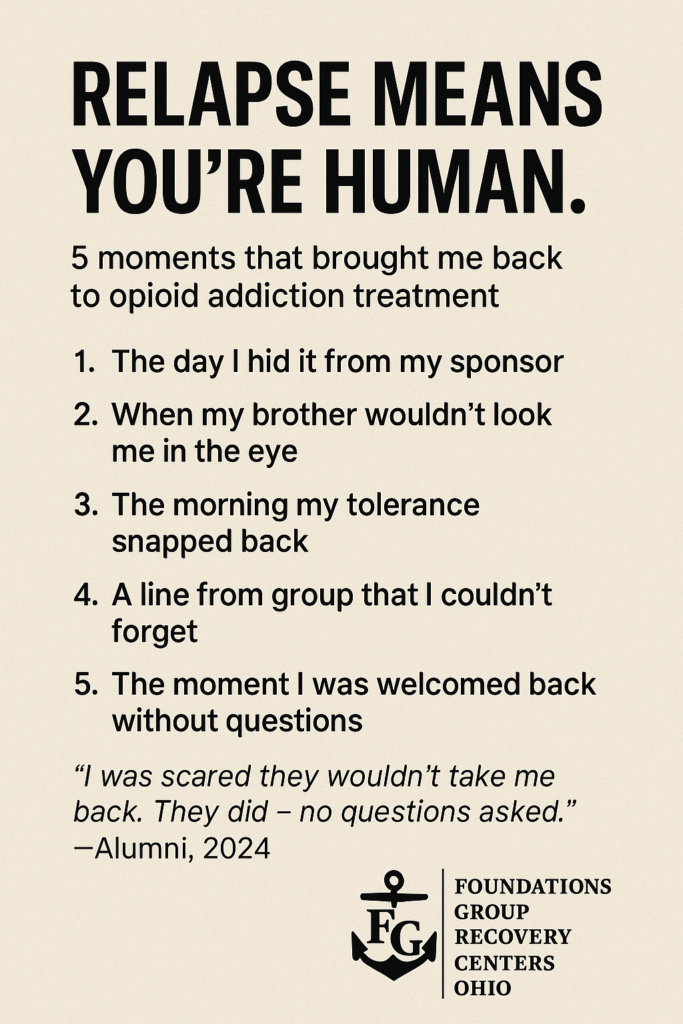I used to believe that relapse erased everything. That it canceled out the progress, the growth, the 90 days I spent learning how to breathe without opioids. I believed that slipping meant starting from zero again—and worse, that it made me a failure.
But I was wrong.
Relapse doesn’t mean you’re broken. It means something still hurts. And you’re still human.
Here are five raw, unfiltered moments that pulled me back toward treatment—moments that reminded me I’m still worth fighting for.
1. The Day I Hid It From My Sponsor
It was a Thursday night. I’d been clean 97 days. I remember the exact number because I was counting—clinging to it like proof that I was finally someone new.
But then came a long day, a missed call, a flash of anger, and a familiar ache in my chest. That night, I found a pill I’d hidden in an old winter coat. Just one.
At least that’s what I told myself.
I didn’t tell my sponsor. Not the next day. Not the next week. That omission burned more than the relapse itself. Because hiding it wasn’t about shame—it was about fear. Fear that I’d lost their respect. Fear that I’d have to start over.
That silence? It became unbearable. That’s what made me call. Not guilt. Not consequences. Just the exhaustion of pretending I was okay.
2. When My Brother Wouldn’t Look Me in the Eye
He stopped by to return my charger. Said he was on his way somewhere, but he didn’t say where. We made small talk. But his eyes? They never met mine.
He didn’t say anything. He didn’t need to. I saw the fear—the resignation. Like he was already preparing himself to lose me again.
I didn’t cry right away. But that night, I broke down. Because I know that look. It’s the one I used to give myself in the mirror when I didn’t recognize who I was anymore.
That moment didn’t “fix” me. But it cracked something open. I realized I didn’t want to become someone he had to grieve while I was still alive.
3. The Morning My Tolerance Snapped Back
Three days in. That’s all it took.
I went from “just one” to needing three just to avoid shaking. It didn’t hit slowly—it hit like a freight train. And I panicked.
Not because I was high. But because I knew this body. I knew this cycle. And I couldn’t lie to myself anymore. I wasn’t managing anything. I was drowning—fast.
That morning, I didn’t shower. I didn’t make excuses. I opened my laptop and searched for a treatment center that didn’t make me feel like I had to beg to come back.
That’s how I found Foundations Ohio. And I’ve never been more grateful.
4. A Line From Group That I Couldn’t Forget
It was months ago. I barely remember the guy’s name. But he said something that stuck:
“Relapse isn’t starting over. It’s starting again, but this time you know the way back.”
At the time, it sounded like one of those feel-good quotes. But now? Now it felt like a map.
I remembered where the meetings were. I remembered the intake questions. I remembered the name of the case manager who told me I wasn’t alone.
That memory turned into motion. That motion turned into hope.

5. The Moment I Was Welcomed Back Without Questions
This one’s hard to write without choking up.
Because I expected shame. I expected, “What happened?” or “We thought you were doing so well.” I braced myself for the cold distance that sometimes shows up when people don’t know what to say.
Instead, I got:
“We’re so glad you called.”
No judgment. No quiz. Just welcome.
It was one of the most healing moments of my recovery. Because it reminded me that treatment isn’t a test you pass or fail. It’s a space you return to when you need help—again, and again if you have to.
What People Say
“I was scared they wouldn’t take me back. They did—no questions asked.”
– Alumni, 2024
“Relapse felt like the end. But now I see it was part of the story—not the whole thing.”
– Outpatient Client
“Walking back into treatment was the bravest thing I’ve done. I’m proud of that now.”
– Former Client, now 6 months sober
FAQ: Relapse and Returning to Opioid Addiction Treatment
Is it normal to relapse after 90 days?
Yes. While it’s not what anyone hopes for, relapse is common—and it doesn’t erase your progress. Many people relapse after 90 days due to emotional stress, lack of support, or unresolved trauma. What matters most is how you respond.
Will treatment centers judge me for coming back?
No. Good treatment centers understand that recovery isn’t linear. Many even have alumni tracks or re-entry programs designed specifically for people who’ve relapsed.
Do I have to start all over again?
Not at all. You bring everything you learned before—insight, experience, and resilience. Returning to treatment is about building on what you know, not starting from zero.
How can I forgive myself for relapsing?
Self-forgiveness takes time. Try to treat yourself like you would treat a friend—compassionately, without minimizing the impact. Therapy, support groups, and peer connections can help rebuild self-trust.
What kind of treatment is best after a relapse?
That depends on your situation. Some benefit from returning to residential care. Others do well in outpatient or MAT (Medication-Assisted Treatment). A professional can help you decide based on your needs, history, and goals.
📞 Ready to Come Back?
If you’re reading this and it feels familiar, you’re not alone. You don’t have to explain. You don’t have to be perfect. You just have to call.
Reach out to us at (888) 501-5618. We’ll meet you where you are—with respect, warmth, and a path forward.
